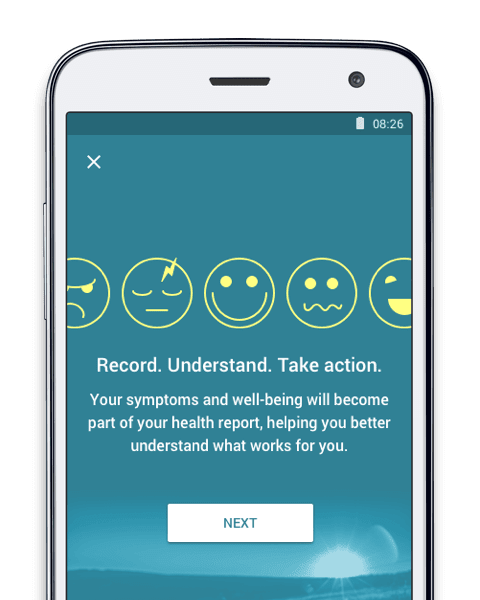You are in physical pain. People stare at you uneasily. Children wonder aloud what is wrong with you. And nothing you try offers any relief. This is why the slogan “the heartbreak of psoriasis” struck a chord with people such as Howard Chang. For Howard, these were the facts of life for years, having been diagnosed with psoriasis as a child. His experiences are ones that many people living with psoriasis – and other ‘visible’ illnesses – will be able to relate to, proving that such conditions are far more than skin deep and can have a devastating emotional impact on one’s life. Having finally found some relief from psoriasis, Howard is now devoted to empowering and supporting others who walk in his footsteps. This is his story.
A guest post by Howard Chang
Entering the Unknown: Being Diagnosed with Psoriasis
I didn’t completely understand why my dad took me out of school that day in fourth grade. I knew that we were headed toward San Francisco for a doctor’s appointment. We arrived after about an hour-long drive at the University of California San Francisco (UCSF) Medical Center. My next recollections include a long wait, many doctors examining my skin, and a confirmation of my diagnosis: psoriasis.
According to the National Psoriasis Foundation, psoriasis is an immune-mediated disease that causes raised, red, scaly patches to appear on the skin. We now know that as an inflammatory condition it also potentially impacts internal organs. It is also associated with other serious conditions such as metabolic syndrome, diabetes, cardiovascular disease, and the related condition psoriatic arthritis.
Psoriatic arthritis occurs in about thirty percent of those with skin psoriasis. Those with psoriasis are also at higher risk for emotional comorbidities including anxiety, depression, and suicidality. Psoriasis is not contagious and is not infectious.
Those early days with psoriasis set me on a lifelong course of continual doctor visits, uncomfortable and ineffective treatments, and emotional despair. Over the near four decades living with psoriasis I can count on one hand the number of times my psoriasis went into remission for a month or two. My first memories of treatments set the stage for how psoriasis led me into the pit of isolation and depression.
Early Psoriasis Treatments
Treating psoriasis is as unique as the individual. Typically, people with psoriasis start with topical treatments such as steroid ointments or coal tar formulations. Next level treatments include ultraviolet light therapy, pills such as the chemotherapy agent methotrexate, and injectable biologic medications. Thankfully treatments evolved to become more effective and convenient than before, although the biologics come with especially high price tags.
I’ve just about tried them all, often in combination using a few different treatments concurrently. As a child I started with topical medications and phototherapy. I disliked applying smelly coal tar (think roofing tar or tar pits) in an emollient such as Aquaphor. My dad helped me “put on medicine” each evening before bedtime. The smell alone kept me awake. We also endured tar staining my pajamas, bedding, and shower stall.
Adding in artificial ultraviolet light to the equation supposedly made both more effective. My mom drove me an hour three times weekly each way to one of the only clinics in the San Francisco Bay Area that provided ultraviolet treatments. In the phototherapy unit the nurse instructed me to wear green goggles without explaining why. No one told me why I needed stand in it with my clothes off, or for how long. Sometimes the light treatments burned my skin with the same sunlight wavelengths that people buy sun protection to block.
Until later in college I primarily used topical steroids, coal tar, a paste called anthralin, and phototherapy to treat my psoriasis with varying degrees of effectiveness. But no one could prepare me for the emotional and social scarring I would endure as my psoriasis worsened.
Social Isolation
One misconception about psoriasis is that psoriasis is only a rash. Psoriasis is far more than skin deep. As with most skin disorders, psoriasis carries a social stigma. People stare. Children ask, “What is that?” Everyone wonders if they will catch it if they get too close. The stigma started as early as biblical times where exiled “lepers,” who could have had any number of conditions of the skin, were quarantined outside the village. One ad campaign for a topical treatment coined the phrase “the heartbreak of psoriasis” pointing out the emotional impact that it can have on an individual.
Feeling misunderstood started at home for me. My older brother called me “tar baby” to tease and torment me. My parents, immigrants from China, did not personally grow up in American society and schools. They also could not empathize with the emotional challenges of living with psoriasis as they worked two jobs to make ends meet.
My teachers at school did not help either. One teacher told my class about my psoriasis and how I would come to class late on phototherapy days. The kids seized on that information to incessantly badger and bully me on the playground. I wore long sleeve pants and shirts even on the hottest days to avoid revealing the lesions on skin to them.
The social ostracism led to greater isolation. I attributed my quite anxious demeanor to my shy personality. But in reality, I wanted to hide away from most everyone except my closest friends.
Other posts you may be interested in on the MyTherapy blog:
- A Teenager’s Sporting Dream – Broken by Psoriasis by John Redfern
- Ehlers-Danlos Syndrome: My Battle with a Rare Disease by Karina Sturm
Emotional Pain
A 2016 report by PsoHappy, a joint venture between LEO Innovation Lab and the Happiness Research Institute, noted that “half of people who are part of the PsoHappy study say they have low self-esteem and 41% say they rarely feel confident.” I could certainly relate to those 41% by the time I entered college.
Recently my college age daughter found my handwritten journals from my university days. One entry from when I was nineteen years old described a time I felt my situation utterly hopeless:
Today I received an ultraviolet light treatment at the clinic. Although it was only a small dose, I was burned and I do not feel very good right now. The way the light often works is that it will cause slight redness in the psoriasis, and the next day it will get a lot better. But the night before, like now, is just terrible. I can hardly breathe deeply and the irritation from open red sores all over my body keeps me from sitting still. I feel all this is so hopeless.
I first was diagnosed with psoriasis when I was about 7. I have had psoriasis for over 12 years now and now it is about as bad as it has ever been. I have taken just about every medication known to the world, but they have not helped me in the least bit… Is there no end to psoriasis? Even at this very moment I can barely sit still. It just gets me on edge!!
The problem is that it will never go away. I need a break.
The night after:
The night seemed to quell the itchiness of the psoriasis, yet the skin is still very red and thick today. I wonder when, and if it will ever go away? I will always have nights like last night, but I don’t really ever want to go through it again. I guess I will have no choice.
Later in the journal I expressed how the challenge of living with psoriasis drove me to reflect on my faith and purpose in life. I thought that if I could see something good coming out of such a difficult situation then I could survive. That purpose would come after the toughest episode I’ve had with psoriasis.
The Worst of the Worst
A major turning point for my health came a little over a decade ago. My dermatologist used everything in his arsenal to treat my ever-worsening psoriasis. But each treatment, lasting a few months, left me worse than before. Eventually I hit a limit. I asked to take time off work. At home I felt useless and emotionally spent. One night I sobbed into my hands wondering if I could endure ninety-five percent psoriasis skin coverage for long.
My dermatologist finally decided I needed to see a psoriasis specialist. He referred me back to UCSF’s Psoriasis Center where doctors first confirmed my diagnosis. I started an effective treatment that unfortunately came with potential serious side effects. But with careful monitoring I decided to try it. Thankfully, within weeks, my skin began to clear.
Around the same time a new class of novel medications that block inflammation pathways on the molecular level emerged. These targeted treatments, called biologics, have continued to evolve with each successive generation. Even though none of them cleared my skin, a couple treatments did provide much needed relief.
With improving skin and health, I started to move forward in life again. I returned to school to receive a Doctor of Ministry degree. I also began a blog on Everyday Health called The Itch to Beat Psoriasis and actively volunteer for the National Psoriasis Foundation. My goal in all my efforts is to empower, inspire, and advocate for those impacted by psoriatic conditions to experience life in all its fullness. Helping others on their psoriasis journey gives me purpose for living each day with my condition.
What’s Next
I’m excited for the next leg of psoriasis research and treatments. My former dermatologist, a researcher and professor from the University of California, Davis Health System, tells me a psoriasis cure is about ten years away. Here in the States, patient advocates like myself are storming the halls of Congress and state legislators to support funding for research and change policies that would enhance access to medical care.
Still, however, much work remains to bring greater awareness to psoriatic conditions. Those with psoriasis continue to face daily social stigma from misconceptions. It’s a mantra for many of us in the psoriatic community that psoriasis is not contagious, and it’s not just a rash. Recent advertisement campaigns from pharmaceutical companies bring some awareness to psoriasis. However, many still do not understand the impact the condition can have on one’s quality of life when looking at the actors on a screen or in a magazine.
Many patients continue to be undertreated. They fear the newer medications and do not treat to the level they need to control their condition. Overall, the psoriasis community needs more education about treatment options and the impact inflammation might have on internal organs and, consequently, longevity. Knowing more about the comorbidities associated with psoriasis through recent research raises the importance of living a healthy lifestyle, including exercise, diet, and rest.
Finally, social isolation with psoriasis can now be something of the past. Information age tools such as social media and messaging allow for those with psoriasis to connect in ways I never could have as a young person with psoriasis. Starting my blog connected me to countless people who no longer felt alone. I see the same happening on Facebook groups, or online communities such as Talk Psoriasis.
I think about that teenage or college me from time to time and how psoriasis severely hampered my life. Through those dark times psoriasis taught me valuable life lessons, including patience, how to ask for help, forgiveness, emotional and spiritual wholeness, and the importance of advocating for others. These lessons fuel me as I continue my efforts to inspire, empower, and advocate.
We would like to thank Howard for sharing his story with us.
If you would like your story featured on the MyTherapy blog, contact Dan here.
Take a look at some of the other guest posts on the MyTherapy blog:



